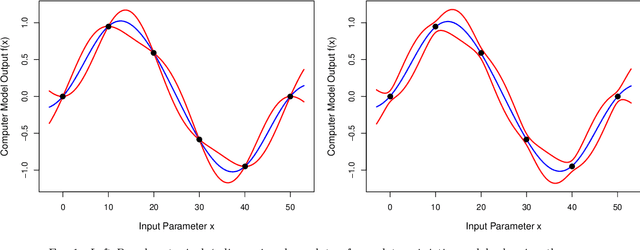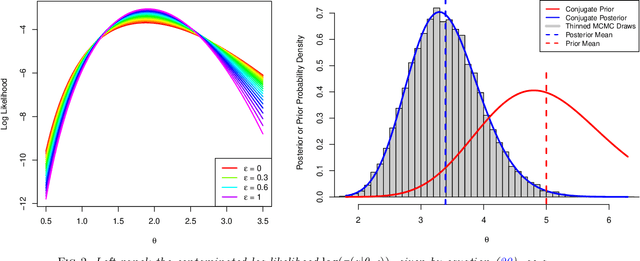Ian Vernon
Bayesian Emulation for Computer Models with Multiple Partial Discontinuities
Oct 19, 2022



Abstract:Computer models are widely used across a range of scientific disciplines to describe various complex physical systems, however to perform full uncertainty quantification we often need to employ emulators. An emulator is a fast statistical construct that mimics the slow to evaluate computer model, and greatly aids the vastly more computationally intensive uncertainty quantification calculations that an important scientific analysis often requires. We examine the problem of emulating computer models that possess multiple, partial discontinuities occurring at known non-linear location. We introduce the TENSE framework, based on carefully designed correlation structures that respect the discontinuities while enabling full exploitation of any smoothness/continuity elsewhere. This leads to a single emulator object that can be updated by all runs simultaneously, and also used for efficient design. This approach avoids having to split the input space into multiple subregions. We apply the TENSE framework to the TNO Challenge II, emulating the OLYMPUS reservoir model, which possess multiple such discontinuities.
A Bayesian computer model analysis of Robust Bayesian analyses
Mar 03, 2017



Abstract:We harness the power of Bayesian emulation techniques, designed to aid the analysis of complex computer models, to examine the structure of complex Bayesian analyses themselves. These techniques facilitate robust Bayesian analyses and/or sensitivity analyses of complex problems, and hence allow global exploration of the impacts of choices made in both the likelihood and prior specification. We show how previously intractable problems in robustness studies can be overcome using emulation techniques, and how these methods allow other scientists to quickly extract approximations to posterior results corresponding to their own particular subjective specification. The utility and flexibility of our method is demonstrated on a reanalysis of a real application where Bayesian methods were employed to capture beliefs about river flow. We discuss the obvious extensions and directions of future research that such an approach opens up.
 Add to Chrome
Add to Chrome Add to Firefox
Add to Firefox Add to Edge
Add to Edge